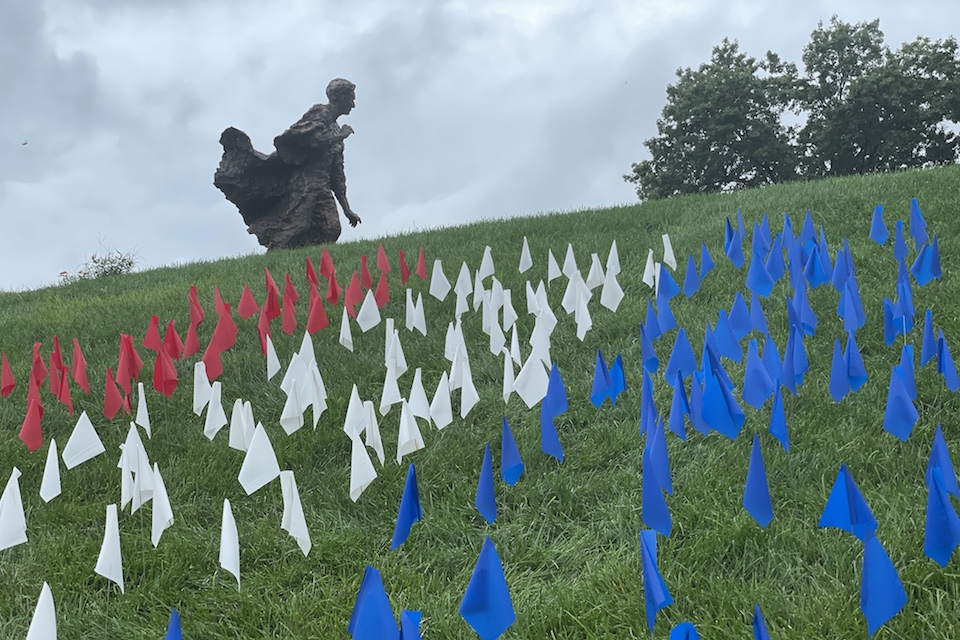Brandeis remembers 9/11
 Photo/Mike Lovett
Photo/Mike LovettBrandeis recognized the 20th anniversary of September 11 with a series of campus-wide memorials and panel discussions last week.
In a memorial in Fellows Garden on Sept. 9, the names of those from Middlesex County who died in the Sept. 11 attacks were read aloud, and Han Kang '22, a member of the Brandeis Emergency Medical Corps (BEMCo), reflected on the courage of the responders. Poems were read by Rabbi Seth Winberg, director of the Center for Spiritual Life and executive director of Brandeis Hillel, and Lara Ericson, assistant director of the Center for Spiritual Life. Behind the memorial, rows of red, white and blue flags were arranged on the slope leading up to the Louis Brandeis statues by Joshua Feld '22 and Zachary Vossler '22. A similar service was held Saturday at 8:30 a.m.
Faculty who were in or near New York City on Sept. 11, 2001 reflected on their own experiences on that day and discussed how the events changed the course of their work and lives during "Then and Now: An exploration of how 9/11 shaped personal and professional lives," a panel held Friday afternoon in Pollack Auditorium. Neil Swidey, professor of the practice in Journalism and director of the Journalism Program; Amy Singer, Sylvia K. Hassenfeld Chair in Islamic Studies and professor of History, and Carol Osler, Martin and Ahuva Gross Professor of Financial Markets and Institutions in the Brandeis International Business School engaged in discussion.
Angela Gutchess, Professor of Psychology; Jennifer Gutsell, Associate Professor of Psychology; Jytte Klausen, Lawrence A. Wien Professor of International Cooperation; and Gary Samore, Professor of the Practice of Politics and Crown Family Director of the Crown Center for Middle East Studies, discussed the events that followed 9/11 and how their research helps us understand the responses of leaders and individual Americans to the events. Classics professor Joel Christensen moderated the panel titled "Politics and Psychology: An Interdisciplinary Discussion of Bias, Perception, Terrorism, and International Policy After 9/11."
Gutchess, who researches memory, noted that even in remembering the attacks, individuals’ memories are notoriously inaccurate. In recalling “flashbulb memories” such as what the sequence of events was for traumatic historic moments, like assassinations or 9/11, many people remember events incorrectly. For example, many people believed they’d seen the airliner crashing into the first tower, when actual footage of the first attack didn’t surface until later.
“What we’ve seen time and time again after these events is that people are still inaccurate...you don’t just forget, you alter details,” she said. But a recollection that helps people remain resilient in the face of tragedy is that of those who helped, like first responders and others who helped survivors.
“Even in the most negative events, you have people looking out for others,” she said.
Categories: General





